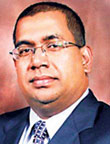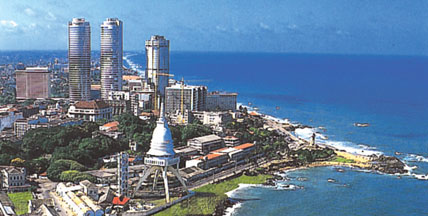On path to 'Smart Sri Lanka' - ICTA CEO
Sri Lanka is now journeying from version 1.0 to version 2.0 of
Development Agenda, 'Smart Sri Lanka' moving from pure technology and
focusing more on innovation, transformation, entrepreneurship and
inclusion, said ICT Agency of Sri Lanka (ICTA), CEO Reshan Dewapura at
the inauguration of IBMSoftwareUniverse2013 in Colombo. It was organised
by IBM Sri Lanka.
 |
|
Reshan Dewapura |
"In the spirit of this event, the IBM Software Universe, where we
have heard much about a smarter planet, let's refer to this version 2.0
of the e-Development Agenda as 'Smart Sri Lanka'. Version 1.0 was e-Sri
Lanka, and by coining this new phrase we are now moving above and beyond
pure technology, and focusing more on innovation, transformation,
entrepreneurship and inclusion," he said.
"Benefitting from the latest advances in technology, more
intelligence and smartness could be introduced to the country, in all
activities in all sections," Dewapura said.
Excerpts of his speech:
IBM is the oldest computer company in Sri Lanka, and have contributed
immensely to the Information and Communication Technology sector in this
country. And like all technology companies, IBM has also gone through a
huge transformation, and I believe one of the objectives of this event,
is to demonstrate that transformation and showcase the new IBM and its
potential in this country.
Organisational transformation is key to success, or even key to
survival.
'Smarter', buzzword in transformation
"Smart or smarter seems to be the buzzword in transformation, and I
would also like to bring this notion, in a Sri Lankan context and share
a few thoughts on a 'smart country' concept, which we hope to take
forward and implement in the future. This I believe is the natural
continuation of the journey in ICT led transformation, which we embarked
upon over eight years ago.
ICT, Information and Communication Technology is a powerful tool. It
can make a tremendous contribution for socio economic development, as a
development accelerator in any sector, to boosting a country's economy
(specially in developing countries such as ours), and provide viable
solutions to the problems of the masses and help improve their lives.
ICT therefore came into the reckoning in national development plans
of countries specially developing countries.
Sri Lanka was no different. In 2005 we embarked on the e-Sri Lanka
journey, an ambitious and pioneering e-Development agenda for the
country, to take the benefits of ICT to every citizen in every village,
every business, and transforming the way government thinks and works.
This ground-breaking initiative not only resulted in major and
numerous achievements and successes in the field of ICT, but also
ensured that this sector developed and matured tremendously in the past
six to seven years. And being a transformational tool, ICT is also a
great leveller, as it brings in inclusivity for all our citizens, like
nothing else can.
 "I would like to look at the development in the ICT sector, in three
dimensions. The Government, the private sector, and the people. In
government, the information infrastructure eco-system is now in place
for all government entities to forge ahead, in re-engineering and
simplifying processes and developing automated systems, to provide a
better service delivery to citizens. "I would like to look at the development in the ICT sector, in three
dimensions. The Government, the private sector, and the people. In
government, the information infrastructure eco-system is now in place
for all government entities to forge ahead, in re-engineering and
simplifying processes and developing automated systems, to provide a
better service delivery to citizens.
Crucial infrastructure systems
Crucial infrastructure systems such as the Lanka Government Network,
the Lanka Gate and the Lanka Government Cloud, are in place. The Lanka
Government Network, connects all government institutions in a cohesive
network, providing the connectivity for easy communication and for data
transfer within the government.
The Lanka Gate, is really a state-of-the-art middleware
infrastructure and a flagship project of ICTA. It functions as the
service delivery platform for any government e-service. In addition, its
front end is also the country portal, with a single window access to
citizen services, and has many delivery channels including the mobile
phone, which is an ever growing phenomenon.
The Lanka Government Cloud, which was provisioned last year, now
provides infrastructure, platform and applications as a service to
government, for hosting any government system, application, content or
service, without the government organisation having to spend on the
infrastructure themselves.
The e-Population Register has also been completed and launched,
creating a single system to store all people related data, which is
relevant to the government. The e-Sri Lanka initiative has successfully
completed a critical number of re-engineering and automating activities,
and e-services projects, on behalf of the government, and many others
are being worked on currently.
For the private sector, mature ICT platforms are now available as
great transformational tools, for progression and growth of their
industries and sectors. And for the ICT sector itself, the environment
is conducive to maximise the opportunities in our country, as a global
ICT destination.
Government interventions
The interventions from the government in terms of capacity building,
encouraging quality certification, business linkages and market
creation, all backed with the provision of substantial resources, has
been key to the tremendous growth and development of the ICT industry.
This industry is now on the path of being a critical growth pillar in
the country's development effort. The IT BPO industry has become the
fifth largest foreign exchange earner in the country at $ 475 million
p.a. and has generated over 50,000 new jobs during the past six to seven
years.
For people, opportunities have been created and the stage set to use
ICT for the betterment of the people, rural communities, and the
disadvantaged and underprivileged groups.
Access to ICT for all through the well-known Nenasalas (the local
tele-centres), the enabling of local language computing, the creation of
local and localised applications, all these have bestowed benefits to
many rural and specially marginalised and under-served communities.
Over 200 ICT based community projects have helped and continue to
help rural and disadvantaged communities on regular basis. ICT literacy
in the country has gone well above 40 percent from being around four
percent only a decade ago.
These efforts have also gone a long way to spawn a local e-content
creation industry in the country, which has now come to be recognised
globally by winning international awards for innovative and impactful
digital creations.
The phenomenal penetration of the mobile phones in Sri Lanka (which
is now over 100 percent) has brought out another dimension to this
thriving developer community, in producing pioneering mobile
applications, and giving rise to a booming mobile content eco-system in
the country, which has been showcased in the UNCTAD Information Economy
Report 2012.
These are some of the achievements in the past, let's move now to see
what the future holds in this e-Development Agenda. What can we expect
in the future? Sri Lanka today, reaping the benefits of post-terrorism
peace, is looking to transform itself to a dynamic global hub in the
region, and more specifically from our point of view to a 'Knowledge
Hub', in the region. Information and Communication Technology will
always play a key role or even the implementation of version 2.0 of the
e-Development Agenda, will be the differentiator, or even trail blazer
in this endeavour to become a Knowledge Hub.
Smart Sri Lanka
In the spirit of this event, the IBM Software Universe, where we have
heard much about a smarter planet, let's refer to this version 2.0 of
the e-Development Agenda as 'Smart Sri Lanka'. Version 1.0 was e-Sri
Lanka, and by coining this new phrase we are now moving above and beyond
pure technology, and focusing more on innovation, transformation,
entrepreneurship and inclusion. Benefiting from the latest advances in
technology, more intelligence and smartness can be induced to the
country, in all activities in all sectors.
The aim is to provide a launching pad for Sri Lanka to become a
knowledge economy and information society, and finally a knowledge hub.
To get to 'Smart Sri Lanka', activities will need to happen in three
areas as before; in government, in the private sector, and in the
citizenry. Albeit, with a much higher emphasis on concepts and
activities which are, more than just technology led improvements. And
again we can coin the phrases 'Smart Government', 'Smart Jobs' and
'Smart People' for these three focused areas.
Smart Government would leverage on the infrastructure eco-systems
already in place, and would use e-government services to demonstrate
transparency, accountability and participation. The continuation of
re-engineering and automating government processes would take place
until all the key public services are available electronically. This we
believe would not only present tremendous benefit to the citizens and
increase participation and usage, but would also improve government
revenue collection and expenditure management systems and boost its
planning, and management activities.
The latest e-Government concepts and trends such as cloud computing,
Open data (albeit with appropriate sensitivity filtering), big data
analysis, and mobility of application and content, should be fully
embraced. With these new concepts, while contributing immensely to the
transparency and accountability of government, citizens will be able to
garner many benefits and would certainly make the government look
smarter in their eyes.
Smart Jobs
As Sri Lanka seeks to become a knowledge and innovation hub, a highly
vibrant ICT services sector becomes a crucial enabler. In this context,
Sri Lankan ICT industry's core competences, which are, the highly
sophisticated software development and the high-end
knowledge-process-outsourcing come into play. This industry can be the
catalyst in bringing global knowledge and demonstrating best practices
in ICT products and services for the benefit of all sectors in Sri
Lanka. It will also help grow, develop and mature, the booming
digital-content industry.
Investment in increasing the capacity, capability and quality of the
Sri Lankan workforce will play a key role in creating this demand.
Empowering and increasing small and medium enterprises, and
encouraging more public-private partnerships, specially with the
industrial sector need to be pursued. To cater to infrastructure
demands, development of technology parks and implementation of
state-of-the-art data centres need to be carried out.
There should be innovation to ensure that the economic environment is
conducive to attract more Foreign Direct Investment, for the formation
of Venture Capital companies, and foster incubators. |


